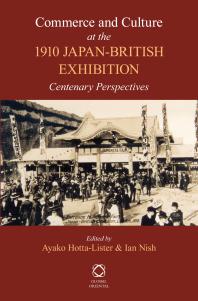

Most ebook files are in PDF format, so you can easily read them using various software such as Foxit Reader or directly on the Google Chrome browser.
Some ebook files are released by publishers in other formats such as .awz, .mobi, .epub, .fb2, etc. You may need to install specific software to read these formats on mobile/PC, such as Calibre.
Please read the tutorial at this link. https://ebooknice.com/page/post?id=faq
We offer FREE conversion to the popular formats you request; however, this may take some time. Therefore, right after payment, please email us, and we will try to provide the service as quickly as possible.
For some exceptional file formats or broken links (if any), please refrain from opening any disputes. Instead, email us first, and we will try to assist within a maximum of 6 hours.
EbookNice Team

Status:
Available4.4
19 reviews
ISBN 10: 9004235426
ISBN 13: 9789004235427
Author: Ayako Hotta Lister, Ian Nish
This volume, intended to complement Hotta-Lister's original 1999 study, marks the centenary of London's 1910 great Japan-British Exhibition, which was held at White City, Shepherd's Bush, and attracted over eight million visitors during its six-month stay. While the initiative came from Britain, the Japanese Government was the major source of funding for the Japanese side of the Exhibition. Using the Anglo-Japanese Alliance as its springboard, Japan - at the time a new colonial power - hoped to bring about a greater understanding of its cultures and traditions and thereby stimulate trade and commerce between the two countries.
In the event, the Japanese press, unlike the British press, took umbrage at what they considered the trivialization of Japanese culture, thus in part frustrating the positive cultural, commercial and political outcomes that were hoped for. Eighteen months later, Emperor Meiji died and the Great War of 1914-18 followed soon after, thereby relegating the exhibition - its origins, composition, relevance and impact - to oblivion until recent times. The papers in this volume, therefore, drawn from four 'centenary conferences' held in London and Tokyo, offer an important spotlight on the exhibition's legacy - specifically in the contexts of commerce and culture.
The contents include the following themes: The Exhibition and domestic conditions in Britain and Japan; the Exhibition and Japan's economic background; selling the 'backward' Japanese economy; imperialism and the Exhibition; the Japanese media and the Exhibition; the arts of Britain and Japan; Ainu in London; Japanese fine art; the human legacy; Japanese gardens.
This book has wide inter-disciplinary relevance for students in modern East Asian Studies, but especially in the context of colonial and economic history, inter-cultural exchange and Anglo-Japanese relations.
Introduction: Centenary Perspectives
Conditions in Japan and Britain at the Time of the Exhibition
Overview: Organization, Aims and Results of the Exhibition
Japan and International Exhibitions, 1862–1910
Rural Manufacturing and Agricultural Production: Selling the ‘Backward’ Japanese Economy
On the Commercial Periphery of the Japan-British Exhibition, 1910
Anglo-Japanese Imperialism and International Exhibitions in the Age of the ‘New Imperialism’
The Exhibition and the Media in the Springtime of Propaganda
Ainu in London, 1910: Power, Representation and Practice of the Ainu Village
1910 Japan-British Exhibition and the Art of Britain and Japan
Treasures of the Nation: Japanese Paintings in the Fine Arts Palace
Japanese Fine Art in the 1910 Japan-British Exhibition
The Japanese Gardens: Stars of the Show
The Human Legacy of the Japan-British Exhibition
Closing Reflections
Appendix I: Extracts from Count Mutsu Hirokichi’s Exhibition Diary
Appendix II: The Times 1910 Japan Supplement
Appendix III: The Japan Society’s Exhibits
the culture and commerce of publishing
the culture and commerce of the textbook
culture and commerce book
culture and commerce
commerce culture and identity
Tags: Ayako Hotta Lister, Ian Nish, Commerce, Culture